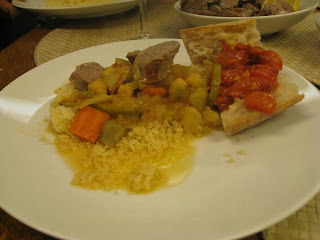Right so here we go. The recipe was in French and even though I speak it, it took some deciphering and dictionaries to determine exactly what the processes were, which I combined with my friends advice and a little googling. What I deduced from the picture above is that the couscoussière is a pot below where you cook the meat and vegetable sauce, and the steam from this sauce cooks the couscous on the top pot with pores (the steamer is open, not closed). To substitute we used a rice cooker (steamer) lined with a lightly floured cheese cloth, though I'm sure you could also use a regular big pot for the bottom and a fine colander for the top. As you add the lukewarm water work the couscous with your fingers.
Making couscous requires that you steam and rest it at least twice. Take your uncooked couscous and put it in a bowl. Pay attention! This is the most important step. Slowly add lukewarm salty water to the couscous grain (not all at once, and not too much). As you add water mix the couscous with your fingers over and over, separating each grain, letting them expand with the warm water. Put the couscous in the open steamer. Cook for about 5-15 minutes, and then put it back in the bowl and fluff it with a fork (if cooked it will be like couscous from a box). Add a little water to moisten it and continue doing the same separating motion. It should never be soupy and avoid making it mushy as well. Wait a few minutes before putting it back in the steamer for 15-45 minutes, depending on how long it steamed the first time you can determine when it is done. Fluff and serve with butter!
 |
| Couscous with vegetable sauce and lamb sausage. |
 |
| Couscous for lunch with caramalized onions. |
